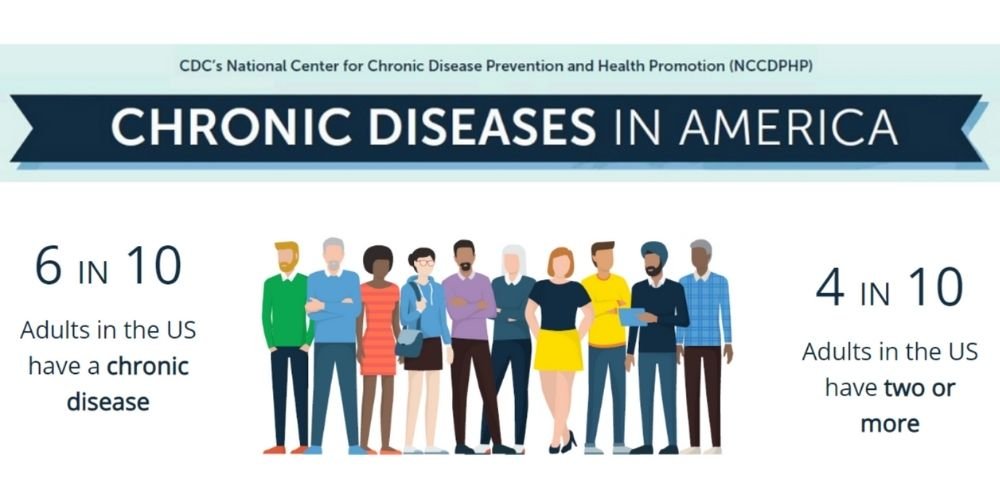The World Health Organization (WHO) reports that chronic diseases are the leading cause of death and disability worldwide. In the United States, the top chronic diseases afflicting millions of Americans are heart disease, lung disease, cancer, and type 2 diabetes. Some of the major risk factors contributing to these chronic illnesses are unhealthy eating habits, lack of physical activities, tobacco use, and excessive alcohol consumption.
Fortunately, improving your overall health can help keep these chronic conditions at bay. This article will share seven healthy lifestyle changes you can make to significantly reduce your risk of getting one or more of these chronic diseases.
What are Chronic Diseases?
Chronic diseases are medical conditions that persist for more than one year. People who have chronic illnesses require continuous medical attention from their primary care physician or healthcare specialist. If you have one or more chronic diseases, you must maintain routine check-ups with your healthcare provider. Individuals who have chronic conditions are more at risk of developing severe complications from COVID-19. Depending on your chronic disease, a healthy lifestyle change can help you manage your illness, and in some cases, eliminate it.
Health Issues in America
Chronic health issues are rising at an alarming rate in the United States. The CDC reports that six in ten Americans have a chronic condition, while four in ten Americans have two or more chronic conditions.

CDC’s data also shows that millions of Americans are afflicted by these top health issues each year:
- Heart Disease and Stroke – The leading cause of death in the United States is from cardiovascular disease and stroke, which affects about one-third of Americans each year.
- Cancer – The second leading cause of death in the United States each year is from cancer. Lung cancer is the leading cause of death, followed by colon, pancreas, breast, and prostate cancers. More than 1.7 million Americans are diagnosed with some form of cancer every year.
- Diabetes – About 34.2 million Americans are affected by diabetes in the United States, while 88 million Americans are afflicted with prediabetes, which puts them at risk of getting type 2 diabetes.
- Obesity – About 19% of children and 42% of adults in the U.S. are obese. People who have this condition are at higher risk of getting type 2 diabetes, heart disease, stroke, or some forms of cancer.
Research indicates that the leading cause of these top health issues stem from poor nutrition, no physical activities, high-stress levels, lack of sleep, tobacco use, and excessive amounts of alcohol. The good news is that you can significantly reduce or eliminate your risk of getting one or more of these chronic diseases by making healthy lifestyle changes.
7 Lifestyle Changes to Improve Health
Healthy lifestyle changes are critical when it comes to managing or preventing chronic diseases. Lifestyle changes can be challenging and will take time, patience, and commitment. But when these positive behavioral changes turn into habits, you will see a significant long-term impact on your overall health.
Here are seven lifestyle changes you can make to improve your health:
1. Eat Healthy
Good nutrition is vital for your physical and mental health. Avoid processed foods that are high in calories, refined carbohydrates, sugar, and fats. Instead, choose foods that are rich in nutrients, vitamins, and minerals such as fruits and vegetables, lean proteins, whole grains, and low-fat dairy to help your body ward off illnesses and chronic diseases.
2. Drink Water
Drinking plenty of water each day is an excellent way to improve your health. Water is great for preventing dehydration, which can lead to mood swings, body overheating, dizziness, and constipation. When you are thirsty, choosing water over other sugary options like sodas and fruit drinks will keep you from gaining weight since water contains no calories. The amount of water you need depends on your health, how active you are, and your environment.
3. Get Active
Adding at least 20-30 minutes of low to moderate physical activities to your daily routine can significantly improve your health. The key is to make this a habit, so choose physical activities that you enjoy doing, like walking, running, hiking, swimming, gardening, biking, or working out the gym. Also, think about doing these activities with a friend or family member to keep you motivated. It doesn’t matter which activity you choose so long as you stay physically active to get the most health benefits.
4. Reduce Stress
Managing stress is crucial to improving overall health. If stress is left untreated, it can cause many health issues such as anxiety, insomnia, fatigue, high blood pressure, heart disease, stroke, and diabetes. Healthy eating, exercise, spending quality time with friends and family, meditation, and disconnecting from electronic devices are great ways to help you manage the stress triggers in your life.
5. Get Enough Sleep
Sleep deprivation can negatively affect your health. It can weaken your immune system and cause memory loss, mood swings, skin problems, high blood pressure, diabetes, obesity, and other chronic illnesses. Adults need an average of 7-9 hours of restful sleep each night. To help you get a more restful night’s sleep, try creating a bedtime routine that you can stick with, like no electronics 30 minutes before bed, no lights in the bedroom, or listening to soothing music.
6. Stop Smoking
According to the CDC, more than 16 million people in the U.S. have one or more diseases caused by smoking. The good news is that smoking is a preventable disease. By eliminating tobacco use, you can reduce your risk of getting cancer, heart disease, stroke, lung diseases, and diabetes.
7. Stop Excessive Drinking
Consuming high amounts of alcohol can have long-term adverse effects on your body and health. Excessive drinking can lead to high blood pressure, heart disease, stroke, liver disease, and digestive problems. The CDC reports that 88,000 deaths in the U.S. are caused by excessive alcohol use each year, and over half of these deaths are from binge drinking. By eliminating excessive alcohol usage, you can reduce your risk of getting more than one of these chronic illnesses.
Benefits of a Nutritionist
If you have one or more chronic diseases, you should consider working with a Registered Dietitian Nutritionist (RDN). RDNs are credential food and nutrition experts who can help you understand how different foods affect your conditions. They can also customize a healthy eating plan to help you manage, and in some cases, reduce or eliminate your chronic illness symptoms.
An RDN can also help if you are struggling to start or maintain a healthy lifestyle. Reading labels and understanding the correct nutrients to eat for your body type and fitness goals can be challenging. An RDN can work with you to create the right plan based on your specific medical conditions and fitness goals.
Some insurances typically cover nutrition counseling with an RDN for chronic conditions, while other insurances may also offer preventative coverage. Be sure to check with your insurance provider to see what RDN benefits they offer.
Take Control of Your Health

The medical team at Mason Park Medical Clinic is ready to help you take control of your health. Our managing physician, Dr. Quyen Trinh, an experienced and well-respected osteopathic doctor in Katy, TX, is nationally recognized by the NCQA for diabetes and heart/stroke management and care.
Whether you’re looking for primary care, chronic care, or need to work with a Registered Dietitian Nutritionist, we have you covered. Call us at (281) 646-0740 to schedule your appointment today.




